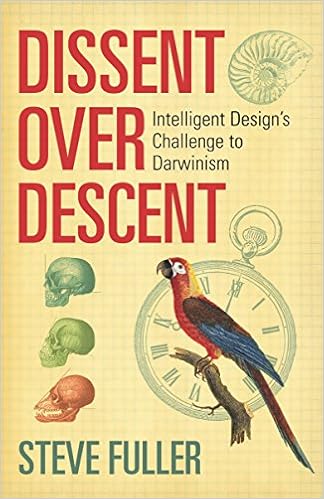 Fuller, author of Dissent over Descent, is a sociologist who studies, among other things, the ID community. In a recent paper in European Management Journal, he reflects on the relationship between expert opinion in a field and the evaluations by educated outsiders.
Fuller, author of Dissent over Descent, is a sociologist who studies, among other things, the ID community. In a recent paper in European Management Journal, he reflects on the relationship between expert opinion in a field and the evaluations by educated outsiders.
He opposes Brexit, but says,
First, I consider Brexit in relation to my own long-standing anti-expertist approach to social epistemology, which in many ways makes me a kindred spirit to the Brexiteers. Next, I turn to the struggle of parliamentary elites which eventuated in the win for Brexit, focussing on the Brexiteers’ distinctive epistemic and ethical strategy with regard to public opinion. Finally, I consider the unforeseen emergence of a Rousseau-style ‘general will’ with regard to Brexit, which is where British democracy stands for the foreseeable future, ending on the role of academia e and specifically business schools e in the antiexpert revolution.
…
Still more recently, I have become concerned about the future of the increasingly ‘research-led’ university, which is arguably a euphemism for the institution’s role in the manufacture and certification of expertise. In this spirit, I have called for a shift in the university’s mission from research back to teaching, which has historically done the most to break down the hierarchies, or ‘bottlenecks’,
that expertise breeds (Fuller, 2016). In this context, teaching should be seen as the regular delivery of knowledge to those who would otherwise remain ignorant by virtue of being removed from the channels in which such knowledge normally travels. To be sure, this levelling of epistemic authority enables more people to ‘own’ formerly expert knowledge, in the resonant sense that ‘own’ enjoys today. But at the same time, it removes the stabilising effect that expert knowledge has had on the social order in the past, given that a wider range of people can take the same knowledge in a wider range of directions.
Of course, he notes, the internet has done the heavy lifting. Anyone can order and read a science paper today. If it’s all posh bosh, lots of people are smart enough to know. Even if they are not experts in the field, they are experts in some field, and bosh often has non-specific markers…
To be sure, intelligent design theory has been hoist by its own petard in US courtrooms as it is regularly ruled to be a crypto- Creationist plot to overturn secular democracy. Yet, there is little evidence that the well-publicised legal defeats suffered by the theory have diminished public support for it. Perhaps more to the point, there is equally little evidence that these defeats have served to increase the public’s belief in evolution, let alone public trust in the scientific establishment that backs evolution. Instead, there is a climate of suspicion and even paranoia that agencies of the state are on a mission to subvert dissenting voices that uphold Christian values. Indeed, if evolution were subject to a national referendum in the US, it might well lose by something like a Brexit-style 52/48 margin.
Ominously for the status quo, even large numbers of atheists still don’t believe the Darwinian evolution theory full whack job (if they ever did) and there is lots of dissent among evolutionary biologists now.
The other important factor in the anti-expert revolt common to intelligent design and Brexit is the establishment’s own admission that there are problems, but these can be solved by staying within status quo. Where intelligent design theory goes beyond earlier forms of Creationism is that it argues not only for an alternative basis for explaining the nature of life (i.e. an ‘intelligent designer’, aka the Abrahamic deity) but also addresses issues that evolutionists have already identified as problematic for their own account.
…
Likewise, as support for intelligent design theory increased, the scientific establishment amplified the theory’s threat to encompass all of science, if not civilisation as such, were it to be taught in schools. Once again, on both matters, the public appears to be much less risk averse than the experts, but equally, by conceding fallibility at the outset the experts unwittingly opened the door to the public taking matters into its own hands.
Actually, we think that the end-of-science rent-a-riot is great theatre, just not good education policy.
At this point, we confront one of the big canards perpetrated by defenders of expertise, namely that anti-experts are anti-intellectuals who privilege ignorance over knowledge and would treat all opinions as equally valid. All that this exercise in misdirection does is to cover up the reverse tendency, namely that our trust in experts in modern democracies has led to a moral dumbing down of the population, as people are encouraged to let authorised others, starting perhaps with the general medical practitioner, decide for them what to believe, even when the consequences of those decisions directly affect people’s lives and sense of self. – Steve Fuller, Brexit as the unlikely leading edge of the anti-expert revolution, European Management Journal, Available online 14 September 2017 https://doi.org/10.1016/j.emj.2017.09.002 More.
But we can always stop when it starts to hurt too much. Anyway, more Fuller below:
Note: Light news posting till later today due to O’Leary for News’s alternate day job.
See also: Dover cleared the decks for critical discussion of Darwinism and design by getting school board micro-politics out of it.
Fuller studies ID as a social movement in science. We hear some colleagues don’t like his views much.
See also: Dover all over
White cliffs. Dover: Creationism invades Europe
The Dover case, John West, and intelligent design
Steve Fuller: Humans will merge with AI
and
Steve Fuller’s Dissent over Descent